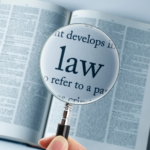
The Economic Dimension of Legal Issues: Why Law Students Need Economic Tutoring
March 24, 2024
Unlocking the Legal Lexicon: How Pre-Law Jargon Prepares Students for Success
March 24, 2024By Freya Fredriksson.
Reading time: two minutes
Before the British Sign Language (BSL) Act 2022, the law prohibited deaf BSL users from completing jury service in England and Wales.
The historical context
The Equality Act 2010 means that courts are required to provide reasonable adjustments to most people with disabilities to enable them to complete jury service. However, profoundly deaf people, who rely on a BSL interpreter, were not allowed to have an interpreter in the jury deliberation room with them, thus excluding them from this act of citizenship. This was because common law rules failed to recognise that a BSL interpreter was there to support the Deaf juror, rather than to act as a 13th juror. This means the legal system in England and Wales failed to accommodate the needs of deaf BSL users by explicitly prohibiting deaf BSL users from participating.
The implications of the exclusion of deaf BSL users from jury service were that by denying a fair representation of society, the justice system risked having more fair and just outcomes in trials. Furthermore, the exclusion perpetuated the marginalisation of deaf individuals, reinforcing a societal narrative of exclusion and inequality.
What is the BSL Act 2022?
BSL is the preferred language of over 87,000 deaf people in the UK and until 2022, whilst it was recognised as a language by the government, it was not set out in law.
However, when the Act came into force on the 28th of June, this meant that the bill gave BSL full legal recognition as a language thus allowing deaf BSL users to serve as jurors alongside their hearing citizens. The BSL Act not only removed these barriers in the legal landscape but also symbolised a crucial shift in attitudes towards deaf BSL users within the legal system. This has helped to remove barriers faced by the D/deaf community and allow them to fully participate in civic duties.
The impact on legal inclusivity
Following this change in the law, the first deaf person, Karen, completed jury service with support from BSL interpreters, symbolising a positive and long overdue step towards equality and inclusion. By recognising the rights of deaf BSL users to participate in jury service, the Act affirmed their status as equal members of society with valuable contributions. This means courts will see more of the Deaf/BSL community being part of the justice system and so our legal system will be more representative of the wider society.
Chloe Smith, a Member of Parliament of the United Kingdom said: “The first Deaf juror completing jury service is an historic moment on our path towards a more inclusive and accessible society.”
What this means for the future
Whilst the BSL Act represented a significant step forward, there are still challenges when it comes to accessing the legal system. For example, there is currently a shortage of Registered Sign Language Interpreters (RSLI) meaning there’s a lack of availability of qualified interpreters which makes it even more difficult as the recommended time for an interpreter to work is around 20 minutes, meaning they need to take a break and have another interpreter fill in, resulting in a higher demand.
Lastly, broader efforts to promote inclusivity and accessibility within the legal system must continue, encompassing not only BSL users but all marginalised communities.
To conclude
The BSL Act 2022 removed barriers to jury service for deaf BSL users and reaffirmed the principles of justice and fairness upon which the legal system is built on. In the future, sustained efforts are needed to keep this up and establish a legal system that accurately reflects society as a whole.





